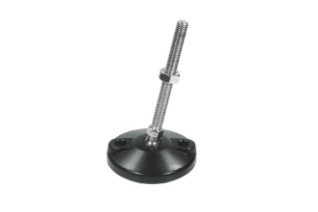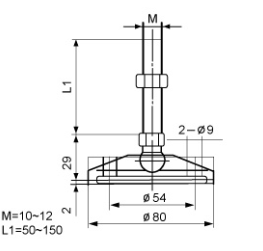Rapid Delivery for Har P738 Joint Feet Type Conveyor Parts to Myanmar Factories
Rapid Delivery for Har P738 Joint Feet Type Conveyor Parts to Myanmar Factories Detail:
Product detail pictures:

To frequently enhance the management process by virtue of your rule of "sincerely, good religion and good quality are the base of company development", we greatly absorb the essence of associated solutions internationally, and regularly produce new goods to meet the needs of shoppers for Rapid Delivery for Har P738 Joint Feet Type Conveyor Parts to Myanmar Factories, The product will supply to all over the world, such as: Myanmar, Sudan, Zimbabwe, The design, processing, purchasing, inspection, storage, assembling process are all in scientific and effective documentary process , increasing usage level and reliability of our brand deeply, which makes us become superior supplier of the four major product categories shell castings domestically and obtained the customer's trust well.
Please visit our web site for information of our unique range of products at https://www.techbelt.co.uk.
We offers a wide range of specialist non-stick PTFE belting for use in textile drying, food production and packaging. All our belts are manufactured at our facility based in the UK. We use high quality materials and can manufacture wide range of belt combinations to suit most machine available on the market.
Teflon Dryer Belts – https://www.techbelt.co.uk/dryer-belts/
Our dryer belt range tands to be offered in the form of an open mesh material. This allows for rapid air movement in and around the conveyor belt for fast drying. We manufacture the belt with edge reinforcements and all come with a mechancial joint. The joint is supplied with a pin to allow fast and easy installation on the machine.
PTFE Food Process Belts – https://https://www.techbelt.co.uk/food-process-belts/
PTFE food belts are usually made with a
mm thick PTFE coated glass cloth. This style is a non mesh, closed weave construction. Applications such as Tortilla and bacon production use these type of belts which are blue in colour. Blue is used as this allows for easy identification if a belt is damaged whilst running and breaks away in to the food stuff
Specific PTFE Belting applications can be view here by following the links below:
Heat Tunnel Belts – https://www.techbelt.co.uk/ptfe-mesh-belts/
Heat tunnel belts are manufactured at Techbelt in the UK. We gereanlly offer these belts with our standard PTFE film edging which is strong and durable. The mesh size has a 4mm square opening for good airflow around the tunnel area. We make the joints with a clipper type fastener which is made from 316 stainless steel.
Polyester Mesh Belts – https://www.techbelt.co.uk/polyester-mesh-belts/
Dewatering Belts – https://www.techbelt.co.uk/de-watering-belts/
Baler Belts – https://www.techbelt.co.uk/baler-belts/
Modular Belts – https://www.techbelt.co.uk/modular-belts/
What is P.T.F.E glass cloth tape?
P.T.F.E glass cloth tape usually refers to an adhesive backed P.T.F.E coated fabric which has either a Silicone or acrylic adhesive applied to one surface. The substrate, or woven glass cloth, usually used for these styles of tapes is referred to as a singles grade.
What’s the difference between a singles substrate and a twisted version?
Singles grades are closed weave substrates (non mesh types) with yarns that are not as tightly wound. More twisted versions are used for PTFE conveyor belts.
Singles substrates are used because they lay flatter that twisted version therefore are more easily covered. Because of this a smoother, high gloss, surfaces can be achieved with less P.T.F.E which also means it is a more cost effective option.
What type of adhesive backings do you offer?
The two main options for adhesive are acrylic and silicone which are applied to the PTFE glass cloth to create the tape. Acrylic has a higher level of tack and adhesion and has an operating temperature range of – 4 / + 177 degrees Celsius. Silicone adhesive has a lower level of tack and needs to be applied with a level of pressure. Silicone has a working temperature range of -73 / +240 degrees Celsius.
How does the adhesive stick to Teflon?
To apply any of the two adhesive systems to a prepared surface, chemical etching of the Teflon needs to take place. Etching one surface of the PTFE can be done by using sodium naphthalenide which is the most common method. Etching removes the fluorine atoms from P.T.F.E (Polytetrafluoroethylene) and creates a carbon based layer that increases the ability to bond and reduces the surface friction.
Is this product available in different colours?
We generally supply this is standard tan colour or occasionally in black, We also stock a silver product along with a blue. Blue is popular within the food processing industry,
Products and services are very good, our leader is very satisfied with this procurement, it is better than we expected,
